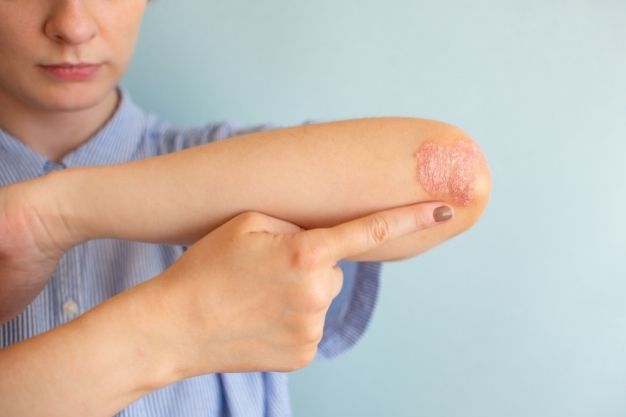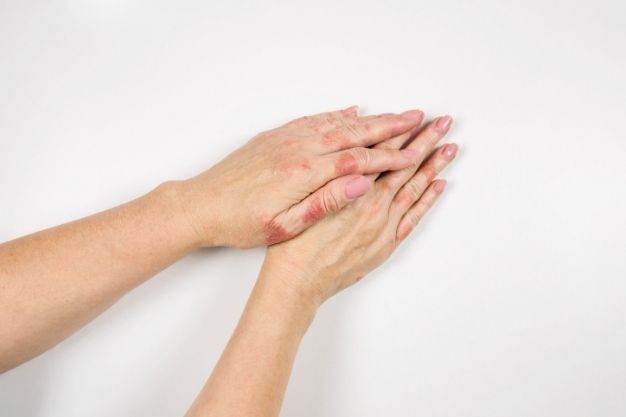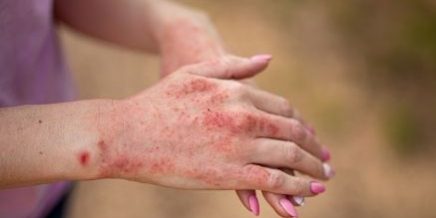Atopic dermatitis is a skin problem that causes your skin to become red and itchy. It is usual in children, but it can happen at any age. Atopic dermatitis is a chronic disease that develops at any age. Asthma or hay fever may follow it. Read the space carefully to get details about atopic dermatitis in adults, symptoms, causes, and homeopathy treatment.
There is no cure for atopic dermatitis in amateur medication, but homeopathy treatment can slow the progress of the disease. On the other hand, treatments and self-care techniques can reduce irritation and prevent future breakouts. Avoiding harsh soaps, moisturizing your skin regularly, and applying medicated lotions or ointments, for example, can all assist.
What exactly is atopic dermatitis?
Atopic dermatitis is a chronic and progressive inflammatory skin disorder. Skin barrier failure is common in children with atopic dermatitis, resulting in dry, itchy, scaly skin. They may also have environmental and food allergies. Atopic dermatitis affects 65 percent of children in their first year of life and 90 percent within the first five years. Half of all afflicted youngsters improve between the ages of 5 and 15. Atopic dermatitis in adults is more likely to have atopic dermatitis in their children.

What causes it?
Dry skin, irritants, stress, allergies, infection, and heat/sweating are the most common causes of atopic dermatitis. It is crucial to mention that these are triggers that increase the symptoms of atopic dermatitis, not causes of atopic dermatitis in adults.
What effect does the environment have on atopic dermatitis?
Atopic dermatitis can be triggered by extremely dry or hot and humid settings. For example, the cold, dry air of winter in our country and the heat and humidity of summer can cause an outbreak of atopic dermatitis. We propose that parents find strategies to protect their children from harsh weather, such as utilizing air conditioners in the summer.
What if I don’t quit scratching the afflicted areas?
Prolonged itching of the skin can result in lichenification, a condition in which the skin becomes thick and leathery. Intense itching can cause skin breakdown, infection, and permanent scarring. While atopic dermatitis in adults is not a life-threatening disease, many individuals with the disorder have an underlying skin barrier deficiency that needs specific skincare for the rest of their lives.
When should you see a doctor?
If you or your kid suffer any of the following symptoms, see a doctor:
- It is so distressing that it interferes with sleep and daily activities
- Look for red streaks, pus, and yellow scabs if you suspect a skin infection
- Symptoms persist despite the use of home treatments
- Seek medical assistance for your child right away if the rash seems to be infectious, and they have a fever
Symptoms
The signs and symptoms of atopic dermatitis vary greatly from person to person and include:
- Dry skin
- Itching that can be intense, especially at night
- Red to brownish-gray spots, particularly on the hands, feet, ankles, wrists, neck, upper chest, eyelids, within the elbow and knee bends, and, in neonates, the face and scalp
- When scraped, small, raised lumps may leak fluid and crust over
- Thickened, cracked, and scaly skin
- Raw, painful, and swollen scratched skin
Atopic dermatitis often develops before the age of five and can last into adolescence and adulthood. It flares up for some people regularly and then subsides for some time, even years.
Causes
Healthy skin aids in moisture content and protects against bacteria, irritants, and allergies. A genetic mutation causes eczema that impairs the skin’s capacity to offer this protection. It allows environmental influences, allergies, and irritants, to damage your skin.
Food allergies may have a role in developing atopic dermatitis in adults.

Factors of Risk
There are certain precautions you may take to avoid atopic dermatitis in adults:
- Create a skincare routine and stick to your homeopath’s instructions to maintain your skin healthily
- Wear gloves when performing tasks that need you to immerse your hands in water. Wear cotton gloves inside plastic gloves to absorb sweat and gloves outside, especially in the cold
- When taking a bath or shower, use a light soap and pat your skin dry rather than rubbing it. Apply a moisturizing lotion or ointment soon after drying your skin to lock in moisture. Reapply cream or ointment every two to three hours
- Take moderate (lukewarm) baths or showers rather than heated ones
- Every day, consume eight glasses of water as a minimum. Water aids in keeping your skin hydrated
- Try not to become too hot and sweaty
- Wear loose-fitting cotton and other natural-fiber clothing. Before wearing new clothes, they should be washed. Wool should be avoided
- Avoid extreme temperature and humidity changes
- Learn to detect and handle stress in your life. Regular cardiovascular exercise, hobbies, and stress-reduction strategies such as meditation or yoga may benefit
- Limit your contact with known irritants and allergies
- Avoid scratching or rubbing itchy skin regions
Complications
Atopic dermatitis complications may include:
Asthma and hay fever: These disorders are sometimes followed by eczema. By the age of 13, more than half of young children with atopic dermatitis develop asthma and hay fever.
Itchy, scaly skin that persists: Neurodermatitis (lichen simplex chronicus) is a skin disease that begins with an itchy patch of skin. You scrape the spot, making it itch even more. You may eventually scratch just out of habit. The afflicted skin may become discolored, thick, and leathery due to this disorder
Skin Infections: Scratching that damages the skin repeatedly can result in open sores and fissures. These increase bacterial and viral infection risk, including the herpes simplex virus
Hand dermatitis that is irritant: This is especially true for persons whose jobs require them to wash their hands often and expose them to harsh soaps, detergents, and disinfectants
Contact dermatitis caused by allergies: This is a prevalent problem in persons who have atopic dermatitis
Sleep issues: The itch-scratch cycle might lead to a lack of sleep
How do I look after myself?
It is critical to reducing your tension. Consider the following suggestions:
- Take a deep breath, and count till 10
- Daily exercise is essential
- Reduce your intake of coffee and alcohol
- Sleep for eight hours every night
- Consume nutritious foods
- Maintain an optimistic attitude
- Every day, keep a journal
Discuss your life with friends, relatives, and especially a homeopath.
Treatment using Homeopathy
Atopic dermatitis is quite normal, extremely prevalent, and extremely painful. It may impact on quality of life you lead. Worse, it can keep you awake, distract you, and make you feel self-conscious in public. As soon as you notice symptoms, contact Dr. Positive homeopathy experts. Investigate both at-home and prescription treatments for atopic dermatitis in adults.








